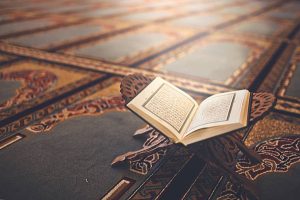
1. When you hear the blessed name of Allah Ta‘ala, then out of respect, you should say “Allah Azza wa Jall” or “Allah Tabaaraka wa Ta’ala” or “Subhaanallah”, etc. Likewise, when you hear the name of Hazrat Rasulullah (sallallahu ‘alaihi wasallam), then say “sallallahu alaihi wasallam”, and when you hear the name of a Sahaabi, then say “radhiyallahu anhu”.[1]
2. When the name of Hazrat Nabi (sallallahu ‘alaihi wasallam) is mentioned in the Deeni discourse or in any gathering, then it is waajib (compulsory) for you to recite durood upon Hazrat Nabi (sallallahu ‘alaihi wasallam) the first time that it is mentioned. Thereafter, whenever the blessed name of Nabi (sallallahu ‘alaihi wasallam) is taken again, it is mustahab (preferable) to recite durood.[2]
3. Upon the conclusion of the gathering, you should recite:
سُبْحَانَكَ اللّٰهُمَّ وَبِحَمْدِكَ أَشْهَدُ أَنْ لَّا إِلٰهَ إِلَّا أَنْتَ أَسْتَغْفِرُكَ وَأَتُوْبُ إِلَيْكَ
Glory be to You, O Allah Ta‘ala, with all praise! I bear witness that there is none worthy of worship except You, I seek Your forgiveness and turn to You in repentance.
عن أبي برزة الأسلمي قال: كان رسول الله صلى الله عليه وسلم يقول بأخرة إذا أراد أن يقوم من المجلس: سبحانك اللهم وبحمدك أشهد أن لا إله إلا أنت أستغفرك وأتوب إليك فقال رجل: يا رسول الله إنك لتقول قولا ما كنت تقوله فيما مضى فقال: كفارة لما يكون في المجلس (سنن أبي داود، الرقم: ٤٨٦١)
Hazrat Abu Barzah (radhiyallahu ‘anhu) reports that it was the habit of Rasulullah (sallallahu ‘alaihi wasallam) to recite the following dua at the conclusion of the gathering whenever he intended to stand up to leave the gathering. One of the Sahaabah (radhiyallahu ‘anhum) enquired, “O Rasulullah (sallallahu ‘alaihi wasallam), (we notice that) you recite a dua at the end of the gathering which you would not recite previously.” Rasulullah (sallallahu ‘alaihi wasallam) replied, “I recite this (abovementioned) dua at the end of a gathering so that it may serve as an atonement for that (futile speech, etc.) which had occurred during the gathering.”[3]
Note: The abovementioned dua is not confined to being recited at the conclusion of a Deeni discourse. Rather, it may be recited at the end of any gathering (whether the gathering is a Deeni gathering or not). The effect of this dua is that it will be a means of kaffaarah (atonement) for the slips and mistakes that had occurred during the gathering.
عن أبي هريرة قال: قال رسول الله صلى الله عليه وسلم: من جلس في مجلس فكثر فيه لغطه فقال قبل أن يقوم من مجلسه ذلك: سبحانك اللهم وبحمدك أشهد أن لا إله إلا أنت أستغفرك وأتوب إليك إلا غفر له ما كان في مجلسه ذلك (سنن الترمذي، الرقم: ٣٤٣٣)
Hazrat Abu Hurairah (radhiyallahu ‘anhu) reports that Hazrat Rasulullah (sallallahu ‘alaihi wasallam) said, “Whoever had sat in a gathering wherein a lot of futile speech took place, and he recites the following (abovementioned) dua before standing up to leave the gathering, then the futile speech which was uttered during the gathering will be forgiven.” [4]
4. If you wish to hear a Deeni discourse over a CD, radio, receiver, etc. then it is important for you to first find out the reliability of the person who had delivered the discourse as well as the subject matter that had been discussed in the talk. Lack of caution in this regard leads to confusion being created in one’s Deen.
عن محمد بن سيرين قال: إن هذا العلم دين فانظروا عمن تأخذون دينكم
Hazrat Muhammad bin Seereen (rahimahullah) had stated, “Indeed this knowledge is your Deen, so be careful from whom you acquire your Deen.”[5]
5. It is waajib (compulsory) for one to remain silent while the khutbah is being delivered e.g. the khutbah of Jumu’ah, nikaah, Eid, etc. If one speaks during the khutbah, one will be sinful.[6]
عن ابن عباس قال: قال رسول الله صلى الله عليه وسلم: من تكلم يوم الجمعة والإمام يخطب فهو كمثل الحمار يحمل أسفارا والذي يقول له: أنصت ليس له جمعة (مسند أحمد، الرقم: ٢٠٣٣)
Hazrat Ibnu Abbaas (radhiyallahu ‘anhuma) reports that Hazrat Rasulullah (sallallahu ‘alaihi wasallam) said, “The example of the one who speaks on the day of Jumu’ah while the imaam delivers the khutbah is like that of a donkey which carries a load of books on its back (i.e. just as a donkey carrying a load of Deeni books on its back does not benefit from the Deeni books, similarly the one who speaks while the khutbah is in progress will not receive any benefit). The one who asks another to remain silent (while the khutbah is being delivered), there is no Jumu’ah for him (i.e. even though he is advising another to remain silent during the khutbah, he himself has committed a sin due to speaking while the khutbah is in progress).”[7]
[1] رجل سمع اسما من أسماء الله تعالى – يجب عليه أن يعظمه ويقول: سبحان الله وما أشبه ذلك (الفتاوى الهندية ٣١٥/٥)
[2] ولو سمع اسم النبي عليه السلام فإنه يصلي عليه فإن سمع مرارا في مجلس واحد اختلفوا فيه قال بعضهم: لا يجب عليه أن يصلي إلا مرة كذا في فتاوى قاضي خان وبه يفتى كذا في القنية وقال الطحاوي: يجب عليه الصلاة عند كل سماع والمختار قول الطحاوي كذا في الولوالجية (الفتاوى الهندية ٣١٥/٥)
[3] وقال الحافظ في المطالب العالية (٥٤٨/١٣): أخرجه ابن أبي شيبة وعنه أخرجه أبو يعلى وأخرجه أحمد والدارمي وأبو داود واللفظ له والحاكم من طريق حجاج بن دينار عن أبي هاشم عن أبي العالية عن أبي برزة الأسلمي به وإسناده ضعيف لحال حجاج بن دينار وهو الواسطي قال الذهبي في المغني: قال الدارقطني ليس بالقوي
[4] وقال: هذا حديث حسن صحيح غريب من هذا الوجه لا نعرفه من حديث سهيل إلا من هذا الوجه
[5] مقدمة صحيح مسلم ١٤/١
[6] (وكل ما حرم في الصلاة حرم فيها) أي في الخطبة خلاصة وغيرها فيحرم أكل وشرب وكلام ولو تسبيحا أو رد سلام أو أمر بمعروف بل يجب عليه أن يستمع ويسكت (بلا فرق بين قريب وبعيد) في الأصح محيط ولا يرد تحذير من خيف هلاكه لأنه يجب لحق آدمي وهو محتاج إليه والإنصات لحق الله تعالى ومبناه على المسامحة وكان أبو يوسف ينظر في كتابه ويصححه والأصح أنه لا بأس بأن يشير برأسه أو يده عند رؤية منكر والصواب أنه يصلي على النبي صلى الله عليه وسلم عند سماع اسمه في نفسه ولا يجب تشميت ولا رد سلام به يفتى (الدر المختار ١٥٩/٢)
[7] وقال العلامة الهيثمي رحمه الله في مجمع الزوائد الرقم: ٣١٢٣: رواه أحمد والبزار والطبراني في الكبير وفيه مجالد بن سعيد وقد ضعفه الناس ووثقه النسائي في رواية
 Ihyaaud Deen An Effort to Revive Deen in Totality
Ihyaaud Deen An Effort to Revive Deen in Totality



